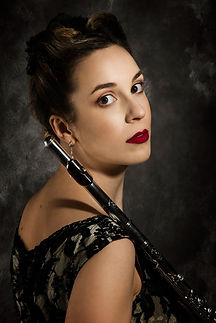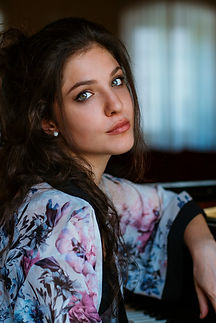Rebeca Taio , flute (Italy)
Italian flutist with a distinguished career from a young age. She has studied with renowned teachers and won awards in international competitions. Her discography includes the albums "Undine" and "Alter Ego," both dedicated to music for flute and piano. She has performed as a soloist and in chamber ensembles, performing works by Mozart, Vivaldi, and other composers.

Margherita Santi , piano (Italy)
Italian pianist renowned for her bold personality, brilliant virtuosity, and distinctive approach. She has performed over 80 concerts across Europe and collaborated with prestigious orchestras and musicians. She is the artistic director of the Herbst Musicaux festival in Verona, which seeks to connect classical music with other arts. Her discography includes works by Chopin, Rachmaninoff, Brahms, among others. She will soon release two new albums for the 2024-2025 season.

PROGRAM
The concert explores the union between Eastern and Western musical cultures, based on the universal theme of love. It includes works that tell stories of love and tragedy, such as the "Butterfly Lovers Concerto" by He Zhan-hao and Chen Gang, inspired by a Chinese legend of thwarted love during the Jin Dynasty (200-300 BC). Also performed are pieces by Prokofiev,
Tchaikovsky and Puccini, which address similar themes of love and transformation.
-
He Zhan-hao (1933-) / Chen Gang (1935-)
Butterfly Lovers' Concerto (version for flute and piano) (1959)
-
Sergei Prokofiev (1891–1953) Arr. Baich, Fletzberger
“Romeo and Juliet” Suite (Original composition: 1935–1936 · Suite: 2002)
-
Pyotr Ilyich Tchaikovsky (1840–1893) Arr. Braunstein
Lensky's aria from “Evgeny Onegin” (1877–1878)
-
Giacomo Puccini (1858–1924) Arr. J. Franz
Fantasy about “Turandot”
(Turandot: 1920–1924 · Fantasia: 2002)
-
Giacomo Puccini (1858–1924)
Un bel dì vedremo from “Madama Butterfly” (1901–1903)
PROGRAM NOTES
Butterfly Lovers is a program that traces an emotional journey through a series of musical tales that, from different eras and cultures, explore a universal theme: love as a transformative force. Each piece included represents a moment in this symbolic journey, from the delicacy of the East to the dramatic passion of the Russian and Italian repertoire. A circular journey that begins and ends in Asia, in which the flow of music unites diverse cultures under a single emotion. The concert opens with the famous Butterfly Lovers Concerto, composed in 1959 by He Zhan-hao and Chen Gang in communist China in the 1950s. This deeply lyrical work is a masterful example of the fusion of Chinese musical tradition and Western academic writing. Throughout the score, echoes of the erhu, pipa, and liuqin can be recognized, as well as references to Chinese opera and popular folklore. The work is inspired by a legend from the Jin Dynasty (3rd century BC): the tragic story of Liang Shanbo and Zhu Yingtai, two young people whose forbidden love culminates in a supernatural outcome. After Liang's death, Zhu throws himself into his tomb, which miraculously opens. From their spirits emerge two butterflies, which take flight together, finally free from earthly constraints.
From Asia, we travel to Russia with the music of Sergei Prokofiev, who in 1935 composed the ballet Romeo and Juliet, inspired by Shakespeare's immortal tragedy. This version for flute and piano presents some of the score's most iconic moments: the Dance of the Knights, the Balcony Scene, Mercutio, the duel, and Tybalt's death. Each fragment has a precise musical identity, and together they shape an intense narrative, full of energy, lyricism, and drama.
Some fifty years earlier, Pyotr Ilyich Tchaikovsky had also addressed the theme of tragic love in his opera Yevgeny Onegin, based on the verse novel by Alexander Pushkin. Premiered in Moscow in 1879, the work contains one of the most moving arias in the Russian repertoire: Lensky's Aria. In it, the young poet faces his impending fate with melancholy and resignation, moments before the fatal duel with his friend Onegin, whom he has challenged after a romantic conflict. The music, of transparent beauty, gives voice to the vulnerability of human beings in the face of loss, honor, and broken friendship.
The program then delves into the passionate world of Giacomo Puccini with a fantasy inspired by Turandot, premiering in Taiwan in 2023. This adaptation for flute and piano features some of the most iconic arias from the opera, written between 1920 and 1924. Turandot was born from the composer's interest in the exotic and the Oriental, fostered during a stay at the Bagni di Lucca, where he discovered traditional Chinese melodies such as Mo Li Hua ("Jasmine Flower"), which he incorporated into the score. The work portrays Princess Turandot, initially cold and cruel, who eventually surrenders to the power of love. The figure of Liù, a humble and self-sacrificing slave, introduces a moving counterpoint of pure and sacrificial love.
The concert concludes with the aria Un bel dì vedremo from Madama Butterfly, another of Puccini's great heroines. Set in early 20th-century Japan, the opera tells the story of Cho-cho-san, a young Japanese woman who awaits with blind faith the return of her American husband, who left three years earlier. In this aria, the protagonist strives to convince herself—and her maid Suzuki—that he will return to stay. But reality proves cruel: he will return only to take their child, leaving Butterfly plunged into despair. The protagonist's final sacrifice transforms her into a symbol of absolute love, devoted to the ultimate consequences.
This is how this musical journey closes: with the same symbol from the beginning—the butterfly—now transformed into a metaphor for the beauty, fragility, and transcendence of love.
